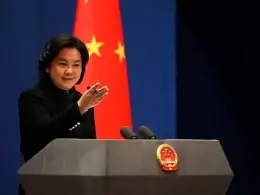Five individuals have been charged with working in the U.S. on behalf of a state-sponsored Chinese secret police agency to silence dissent and harass outspoken Chinese nationals living in the U.S., the Justice Department announced Wednesday.
Prosecutors unsealed three separate criminal complaints in federal court alleging the defendants stalked, harassed, and spied on Chinese nationals living in New York and throughout the U.S. The individuals, allegedly acting on orders from the Chinese Ministry of State Security (MSS), engaged in various schemes, ranging from attempting to blackmail a congressional candidate with false claims of prostitution to trying to bribe an Internal Revenue Service employee to obtain one victim's tax returns. At least one victim was even jailed in Hong Kong as a result of one of the criminal schemes.
Qiming Lin is accused of trying to intimidate a dissident who planned to run for Congress. The unnamed victim is a former student leader of the 1989 Tiananmen Square protests who later moved to the U.S., joined the military and became a naturalized citizen.
According to the criminal complaint, in September of 2021, about six months before the primary elections for Congress, Lin allegedly hired a private investigator to undermine the candidate before he could be elected. Investigators say he communicated with a private investigator "to see if there could be a scandal about the Victim that could be publicly released, such as an extramarital affair" or stealing money. If no scandals could be found, Lin allegedly asked, "'can they create some?'"
"Right now we don't want him to be elected,'" Lin said, according to the indictment.
Lin even allegedly suggested to the private investigator, "You go find a girl for him [the Victim], see if he would take the bait," attempting to set the candidate up with a prostitute, and he instructed the private investigator to "dig up things from 1989 to now …[t]o see if there are any flaws before participating in the election now."
Court documents reveal Lin left a voicemail on the private investigator's phone suggesting physical violence would also be an acceptable approach to getting the dissident to drop his campaign.









